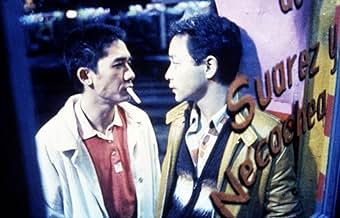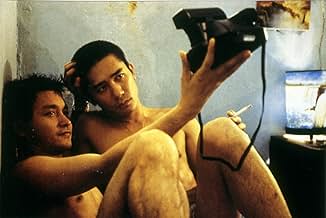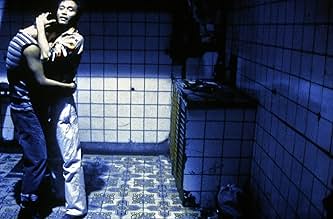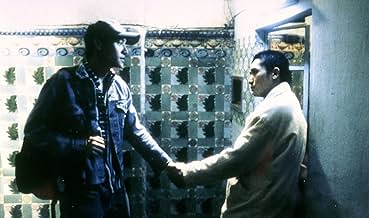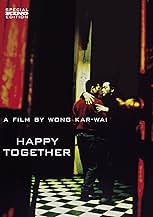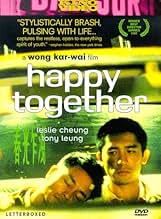ÉVALUATION IMDb
7,7/10
37 k
MA NOTE
Un couple fait un voyage en Argentine, mais les deux hommes se rendent compte que leurs vies prennent des directions opposées.Un couple fait un voyage en Argentine, mais les deux hommes se rendent compte que leurs vies prennent des directions opposées.Un couple fait un voyage en Argentine, mais les deux hommes se rendent compte que leurs vies prennent des directions opposées.
- Prix
- 7 victoires et 20 nominations au total
Tony Leung Chiu-wai
- Lai Yiu-fai
- (as Tony Chiu Wai Leung)
Shirley Kwan
- Fai's Girlfriend
- (scenes deleted)
Avis en vedette
Just when you thought that you knew everything about Hong Kong cinema or about romantic adventures in film, director Kar Wai Wong steps forward and eliminates all boundaries. Transforming your typical picture of a straight couple and violently handing us the relationship of Yiu-fai and Po-wing using untraditional cinematography is only scratching the surface of this picture. If you found yourself shocked by the opening sequence or annoyed by the drastic image of the film, then you definitely are not a film junkie. This movie had everything a cinephile would desire like strong characters, a non-linear story, and the brazen truth about modern society's relationships. This was more than just a gay film, but instead a story about emotions and loves, coupled with all the turmoil that surrounds it. It is ironic that the title of the film is Happy Together, because it completely challenges the true themes. It is about love, but about the difficulties that surround a dying relationship. From the visual opening to the amazing use of several different cinematography techniques, Happy Together may not suit everyone, but to this film junkie it opened a new door in Hong Kong cinema.
This film would not have worked if it weren't for the apparent brilliance of director Kar Wai Wong. While I have been impressed with his other films like In the Mood for Love and his work on the BMW series, The Hire, this film literally blew me out of the water. To begin, the opening sequence. If this very sexual opening doesn't set the tone for the rest of the film, I don't know what will. I was shocked, disturbed, and on-edge the entire time. I didn't see the love between our two characters at all in the beginning, but that was because it was to show the destruction of their relationship. Then, Wong did several things that just impressed me and kept my attention focused on the film. First, he took these two vacationing men from Hong Kong and set them in a foreign city. So, not only was it uneasy to watch this relationship disintegrate in front of our eyes, but to be lost in a unfamiliar city only made it worse. Second, he focused the camera on only one of the characters (Yiu-fai) to enhance that sensation about Po-wing's indiscretions. Through Yiu-fai we felt the human emotions just boil through of having to see a love that only hurt. Finally, he continually changed the cinematography through different scenes. This was impressive because it only added more tension to our characters and themes. Two travelers lost in a foreign country, trying to patch a dying relationship, with a constantly changing cinematic style, was tough to watch but that was the theme that Wong wanted to capture. This is not your typical romantic picture, but instead it showcases the truth about two men that perhaps were not the greatest fit. Even when he throws in the waterfall element, it only adds to the overall theme. The waterfall, to me, represented the falling relationship. Beauty on the outside, a violent tendency as the water falls just like our relationship.
Wong successfully created this tension by hiring some of Hong Kong's best actors. They carried themselves with the greatest of comfort and control. I felt as if I knew these characters by the end of the film. I felt as if I had gone through a similar struggle as they did. These two men challenged the idea of "normal" relationships, yet kept their personas simple, human, and intense. You could not help but feel emotion for these two, even if you did not like the story. They kept the tones light when they needed to be, then brought you deep within the rabbit hole when the darkness erupted. The final scenes of this film are fascinating to watch, and I had to see them again. The downfall of Yiu-fai into a role similar to Po-wing was heartbreaking, yet stunning. Here we have two men who I thought were complete opposites from the beginning, yet somehow, to quote Wong, "Turns out that lonely people are all the same."
Finally, I cannot finish without saying that the cinematography was outstanding in this film. The use of black and white in the beginning and slowly bringing in the colors was breathtaking. This film was more than just actors working for a director, but instead a director creating art. Christopher Doyle bulls-eyed the tone of the film and brought forth an intense picture that only complimented Wong's work. It just impresses me to see a film, like Happy Together, where all the elements come together and work in unison. It is a rarity in today's Hollywood, but thankfully we have directors like Kar Wai Wong whom embrace it. From the beginning of the movie until the final scenes, Doyle challenges an brings together some of the most beautiful scenes in cinema, transforming the normal into the extraordinary.
Overall, this was a spectacular film. After I watched it the first time, I had to see it again, but didn't know if I could. Its emotional strength was so overwhelming that I had to stop myself. I couldn't watch these two brilliant actors tear my heart apart again. It was a sad film, it was an angry film, but most importantly it was a film about being lost in love. Those who may have enjoyed Lost in Translation, this would be a great film to match with it. While not structured the same, it does give us that feeling of being apart in a new world, struggling to get home or to discover one's self. Wong is one of the greatest directors in the world, and I cannot wait to open my soul to his work again. Brilliant film-making, determined and unmatched acting, coupled with the best cinematography this world has ever encountered! A must for everyone!
Grade: **** out of *****
This film would not have worked if it weren't for the apparent brilliance of director Kar Wai Wong. While I have been impressed with his other films like In the Mood for Love and his work on the BMW series, The Hire, this film literally blew me out of the water. To begin, the opening sequence. If this very sexual opening doesn't set the tone for the rest of the film, I don't know what will. I was shocked, disturbed, and on-edge the entire time. I didn't see the love between our two characters at all in the beginning, but that was because it was to show the destruction of their relationship. Then, Wong did several things that just impressed me and kept my attention focused on the film. First, he took these two vacationing men from Hong Kong and set them in a foreign city. So, not only was it uneasy to watch this relationship disintegrate in front of our eyes, but to be lost in a unfamiliar city only made it worse. Second, he focused the camera on only one of the characters (Yiu-fai) to enhance that sensation about Po-wing's indiscretions. Through Yiu-fai we felt the human emotions just boil through of having to see a love that only hurt. Finally, he continually changed the cinematography through different scenes. This was impressive because it only added more tension to our characters and themes. Two travelers lost in a foreign country, trying to patch a dying relationship, with a constantly changing cinematic style, was tough to watch but that was the theme that Wong wanted to capture. This is not your typical romantic picture, but instead it showcases the truth about two men that perhaps were not the greatest fit. Even when he throws in the waterfall element, it only adds to the overall theme. The waterfall, to me, represented the falling relationship. Beauty on the outside, a violent tendency as the water falls just like our relationship.
Wong successfully created this tension by hiring some of Hong Kong's best actors. They carried themselves with the greatest of comfort and control. I felt as if I knew these characters by the end of the film. I felt as if I had gone through a similar struggle as they did. These two men challenged the idea of "normal" relationships, yet kept their personas simple, human, and intense. You could not help but feel emotion for these two, even if you did not like the story. They kept the tones light when they needed to be, then brought you deep within the rabbit hole when the darkness erupted. The final scenes of this film are fascinating to watch, and I had to see them again. The downfall of Yiu-fai into a role similar to Po-wing was heartbreaking, yet stunning. Here we have two men who I thought were complete opposites from the beginning, yet somehow, to quote Wong, "Turns out that lonely people are all the same."
Finally, I cannot finish without saying that the cinematography was outstanding in this film. The use of black and white in the beginning and slowly bringing in the colors was breathtaking. This film was more than just actors working for a director, but instead a director creating art. Christopher Doyle bulls-eyed the tone of the film and brought forth an intense picture that only complimented Wong's work. It just impresses me to see a film, like Happy Together, where all the elements come together and work in unison. It is a rarity in today's Hollywood, but thankfully we have directors like Kar Wai Wong whom embrace it. From the beginning of the movie until the final scenes, Doyle challenges an brings together some of the most beautiful scenes in cinema, transforming the normal into the extraordinary.
Overall, this was a spectacular film. After I watched it the first time, I had to see it again, but didn't know if I could. Its emotional strength was so overwhelming that I had to stop myself. I couldn't watch these two brilliant actors tear my heart apart again. It was a sad film, it was an angry film, but most importantly it was a film about being lost in love. Those who may have enjoyed Lost in Translation, this would be a great film to match with it. While not structured the same, it does give us that feeling of being apart in a new world, struggling to get home or to discover one's self. Wong is one of the greatest directors in the world, and I cannot wait to open my soul to his work again. Brilliant film-making, determined and unmatched acting, coupled with the best cinematography this world has ever encountered! A must for everyone!
Grade: **** out of *****
In this Wong Kar Wai production, loneliness takes on the face of 3 Chinese travellers who, after alienating themselves from the society they came from, end up at the end of the world. Argentina, which is the antithesis of HK, may be the farthest place you can get from HK, but still they cannot entangle themselves from the emotional baggage they have been carrying. Loneliness is a state of mind which follows you no matter where you are, and ensnarls you when you are at your most vulnerable.
While the story may be more famous as a film about gay relationship, it is in fact, not so. The lead characters just happen to be gay, and loneliness, with all the jealousy and melancholy that comes with it, takes centrestage.
While the story may be more famous as a film about gay relationship, it is in fact, not so. The lead characters just happen to be gay, and loneliness, with all the jealousy and melancholy that comes with it, takes centrestage.
Aw-kommon's notes on "Happy Together" are typical of those who cannot approach a film without aligning it with definite paradigms and secure standards. In this case, the paradigm is "Midnight Cowboy" -- a film that belongs to a totally different genre, was written and shot according to "naturalistic" procedures of Hollywood commercial cinema and, most of all, deals with romance from a quite different perspective. In "Midnight Cowboy" redemption of homoeroticism comes through death, a strategy that was quite revealing of the morals that prevailed at the time the movie was produced. "Happy Together", on the other hand, deals with romance as if it could have been homo-, hetero- or whatever, and even though homoeroticism is such an essential element to the narrative, the protagonists'love affair is a pretext for the emergence of their decentered identities, their search for love and friendship and, most important, it ends on a note of hope of future encounters. All that in a poetic tone, one that demands a continuous esthetic reconstruction, hardly understood (or accepted) by those who are encapsulated in a world of conventional filmmaking.
I didn't think so the first time I saw HAPPY TOGETHER, but I really think this film is a masterpiece. Technically it's amazing - the hand-held camera-work is incredible, and the mindbending shifts from saturated colors to monochrome (which I first felt was a stylish stunt) really underscores the loneliness and alienation of the characters brilliantly - the overall effect by the films' end is devastating.
HAPPY TOGETHER was apparently also - at least partially - inspired by the Argentine novelist Manuel Puig, author of 'Kiss Of The Spider Woman' among many other novels, and Puig's fiction tackles similar issues in a similarly fractured style (filled with footnotes, digressions and sudden shifts in perspective), all to incredibly powerful emotional effect.
If HAPPY TOGETHER is something of an homage to Puig, it's a great one. On it's own it's also a devastating portrait of a disintegrating relationship.
HAPPY TOGETHER was apparently also - at least partially - inspired by the Argentine novelist Manuel Puig, author of 'Kiss Of The Spider Woman' among many other novels, and Puig's fiction tackles similar issues in a similarly fractured style (filled with footnotes, digressions and sudden shifts in perspective), all to incredibly powerful emotional effect.
If HAPPY TOGETHER is something of an homage to Puig, it's a great one. On it's own it's also a devastating portrait of a disintegrating relationship.
Something of an obvious precursor to the subsequent masterpiece In the Mood for Love (2000); Happy Together (1997) is a tragic love story by way of recollection. If you're at all familiar with the work of director Wong Kar-Wai - from his breakthrough film Days of Being Wild (1991), to his more recent masterwork, the unsung 2046 (2004) - then you'll be accustomed to his personal approach to cinema; from that continually drifting sense of quiet melancholy and disconnected ennui - all captured by a roving camera that conspires to alienate characters from one another by intrusive shot composition and naturalist production design - and a beguiling approach to the concept of time continually abstracted in order to create drama from moments of fond reminisce. Once again, the feeling expressed in Happy Together is that of loneliness and despair, as characters drift spectre-like through desolate cities attempting to cling to moments and memories as if gasping for their final breath; and all the while distorted by a frequently hypnotic approach to music, structure, pace and cinematography.
If the film lacks the sophistication of the aforementioned In the Mood for Love, it is only because the process of refinement has replaced the edginess and earthiness of this film, with a studied, technical grandeur and ornate beauty that is really quite transcendent. Nonetheless, the style and tone of Happy Together fits the mood of the film perfectly; capturing the feckless uncertainly of the character's lives - both together and apart - and concurrently suggesting the idea of memory and repetition that plays an important role in the way the narrative ultimately plays out. The first viewing might very well be confusing, with scenes occurring that seem to simultaneously represent both the past and the present, and with information presented in a series of incredibly quick cuts, disconnected voice-over and a continually jarring cross-cutting back and forth between lurid colour and an oddly tinted monochrome, which seems to work on an emotional level, as opposed to any kind of narrative convention.
That said, the grittiness of the film suggests an uncompromising and starkly unconventional beauty in keeping with the film's central relationship; with the violent and volatile shifts in stock capturing the same unpredictable impulses and urges of the central characters as they fight, break-up, reconcile and drift apart against a rolling backdrop of exotic and atmospheric locations. The use of Buenos Aires as the central setting adds texture to the film, and the vibrant way in which the director captures the strange, mysterious and nocturnal atmosphere of the city is evocative to say the least. Here, the rhythm of the film becomes tuned to that of the Argentine tango that swirls through the bar where the characters rediscover one another; with the staccato rhythms of the movement underscored by the sad reflections of the accordion music and the stampeding percussion of feet against floors, combined with continual hints of tortured romanticism - touching without feeling, sensing without sensuality, etc - that are so central to these characters and the odd situation they find themselves in.
The location also ties in with the filmmaker's fondness for the work of author Manuel Puig; whose style of writing has some influence on the tone and languid energy of the film in question, with Wong and his crew - and in particular cinematographer Christopher Doyle - expressing certain unspoken facets of this relationship through framing, movement, colour and rhythm. The fact that the film focuses on a homosexual relationship is ultimately secondary. As is often the case with Wong Kar-Wai, the film is about that urge and desire to belong to something - or someone - and the pursuit of an unrequited love that is powerful enough to drive you to the end of the world. We see these themes repeated again and again, from the inter-linked meta-romance of Days of Being Wild, In the Mood for Love and 2046, to the brilliance of Chungking Express (1994). Through the jarring nature of the relationship between the reckless and subtly abusive Ho Po-Wing and the more sensitive and brooding Lai Yiu-fai, Wong is able to express a series of thoughts and ruminations of the notions of love in a way that is intelligent, but always easy to identify with, regardless of gender or sexuality.
Later in the film, the director expresses slightly more profound feelings through the friendship of Lai Yiu-fai and the young runaway Chang. Here, we see a mutual respect and unspoken love that goes beyond sex and sexuality; creating a pure statement on the notion of love and the desire to belong to someone or something, within a certain time or place. A love so great that the person would be willing to carry your own sadness to the end of the world, to lessen the burdens of life and open the door to a new beginning free of difficulties and strife. There are deeper themes expressed throughout - too many to go into in this review - nonetheless, the film is understated and brimming with emotion; in keeping with the director's more iconic or well-regarded films, such as the ones aforementioned, and continuing a number of important themes and motifs that are both thought-provoking and affecting. The film also benefits from the fine performances of the three lead actors, stunning locations, cinematography, great atmosphere, mood and spirit; and an overall approach to cinema that is poetic, to say the least.
If the film lacks the sophistication of the aforementioned In the Mood for Love, it is only because the process of refinement has replaced the edginess and earthiness of this film, with a studied, technical grandeur and ornate beauty that is really quite transcendent. Nonetheless, the style and tone of Happy Together fits the mood of the film perfectly; capturing the feckless uncertainly of the character's lives - both together and apart - and concurrently suggesting the idea of memory and repetition that plays an important role in the way the narrative ultimately plays out. The first viewing might very well be confusing, with scenes occurring that seem to simultaneously represent both the past and the present, and with information presented in a series of incredibly quick cuts, disconnected voice-over and a continually jarring cross-cutting back and forth between lurid colour and an oddly tinted monochrome, which seems to work on an emotional level, as opposed to any kind of narrative convention.
That said, the grittiness of the film suggests an uncompromising and starkly unconventional beauty in keeping with the film's central relationship; with the violent and volatile shifts in stock capturing the same unpredictable impulses and urges of the central characters as they fight, break-up, reconcile and drift apart against a rolling backdrop of exotic and atmospheric locations. The use of Buenos Aires as the central setting adds texture to the film, and the vibrant way in which the director captures the strange, mysterious and nocturnal atmosphere of the city is evocative to say the least. Here, the rhythm of the film becomes tuned to that of the Argentine tango that swirls through the bar where the characters rediscover one another; with the staccato rhythms of the movement underscored by the sad reflections of the accordion music and the stampeding percussion of feet against floors, combined with continual hints of tortured romanticism - touching without feeling, sensing without sensuality, etc - that are so central to these characters and the odd situation they find themselves in.
The location also ties in with the filmmaker's fondness for the work of author Manuel Puig; whose style of writing has some influence on the tone and languid energy of the film in question, with Wong and his crew - and in particular cinematographer Christopher Doyle - expressing certain unspoken facets of this relationship through framing, movement, colour and rhythm. The fact that the film focuses on a homosexual relationship is ultimately secondary. As is often the case with Wong Kar-Wai, the film is about that urge and desire to belong to something - or someone - and the pursuit of an unrequited love that is powerful enough to drive you to the end of the world. We see these themes repeated again and again, from the inter-linked meta-romance of Days of Being Wild, In the Mood for Love and 2046, to the brilliance of Chungking Express (1994). Through the jarring nature of the relationship between the reckless and subtly abusive Ho Po-Wing and the more sensitive and brooding Lai Yiu-fai, Wong is able to express a series of thoughts and ruminations of the notions of love in a way that is intelligent, but always easy to identify with, regardless of gender or sexuality.
Later in the film, the director expresses slightly more profound feelings through the friendship of Lai Yiu-fai and the young runaway Chang. Here, we see a mutual respect and unspoken love that goes beyond sex and sexuality; creating a pure statement on the notion of love and the desire to belong to someone or something, within a certain time or place. A love so great that the person would be willing to carry your own sadness to the end of the world, to lessen the burdens of life and open the door to a new beginning free of difficulties and strife. There are deeper themes expressed throughout - too many to go into in this review - nonetheless, the film is understated and brimming with emotion; in keeping with the director's more iconic or well-regarded films, such as the ones aforementioned, and continuing a number of important themes and motifs that are both thought-provoking and affecting. The film also benefits from the fine performances of the three lead actors, stunning locations, cinematography, great atmosphere, mood and spirit; and an overall approach to cinema that is poetic, to say the least.
Le saviez-vous
- AnecdotesChang Chen's storyline was completely improvised. Director Wong Kar-Wai discovered the restaurant, China Central, by chance and, seizing Leslie Cheung's absence due to a concert tour, decided to keep shooting. Chang's plot was thus created.
- GaffesWhen Po-Wing knocks the packs of cigarettes off the clock, it says 2:38, but then it cuts to another angle of him doing this with the clock saying 3:33, and then it cuts again to the clock saying 2:38.
- Citations
Lai Yiu-fai: Turns out that lonely people are all the same.
- Générique farfeluIn some prints, Jacques Picoux (the French subtitle translator) is listed twice in a row in the closing credits.
- Autres versionsDuring a fire accident in 2019 while the 4K digital restoration was in progress, some of the original 35mm camera negative was lost. In the ensuing months the negative was attempted to be restored as much possible, but a portion of it had been permanently damaged. Lost was not only some of the picture but also the sound in those reels. As a result, Wong had to shorten some of Tony Leung's monologues, but with the work of the restoration crew of L'Immagine Ritrovata, they managed to restore most of the scenes to better quality.
- ConnexionsFeatured in The Movie Show: Episode dated 25 May 1997 (1997)
- Bandes originalesCucurrucucu Paloma
by Caetano Veloso
Meilleurs choix
Connectez-vous pour évaluer et surveiller les recommandations personnalisées
- How long is Happy Together?Propulsé par Alexa
Détails
- Date de sortie
- Pays d’origine
- Langues
- Aussi connu sous le nom de
- Happy Together. Historia de un encuentro
- Lieux de tournage
- sociétés de production
- Consultez plus de crédits d'entreprise sur IMDbPro
Box-office
- Budget
- 4 200 000 $ US (estimation)
- Brut – États-Unis et Canada
- 320 319 $ US
- Brut – à l'échelle mondiale
- 1 539 811 $ US
- Durée
- 1h 36m(96 min)
- Couleur
- Mixage
- Rapport de forme
- 1.85 : 1
Contribuer à cette page
Suggérer une modification ou ajouter du contenu manquant


